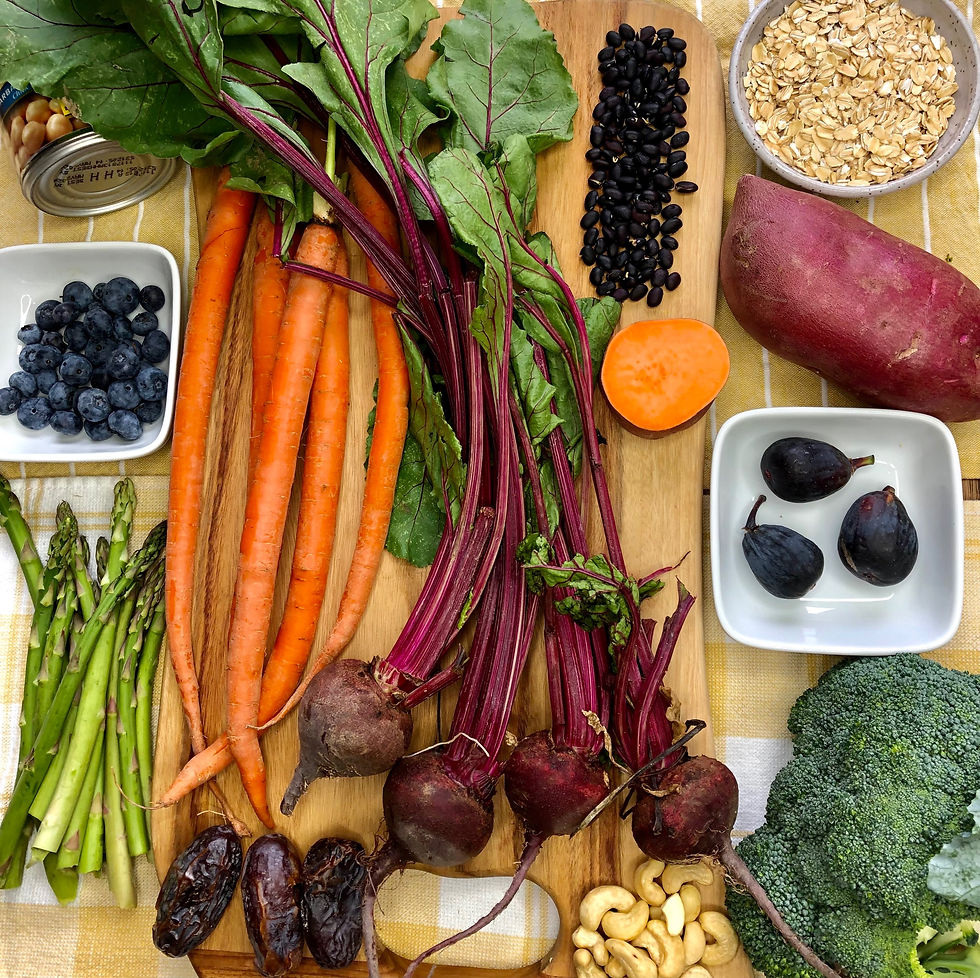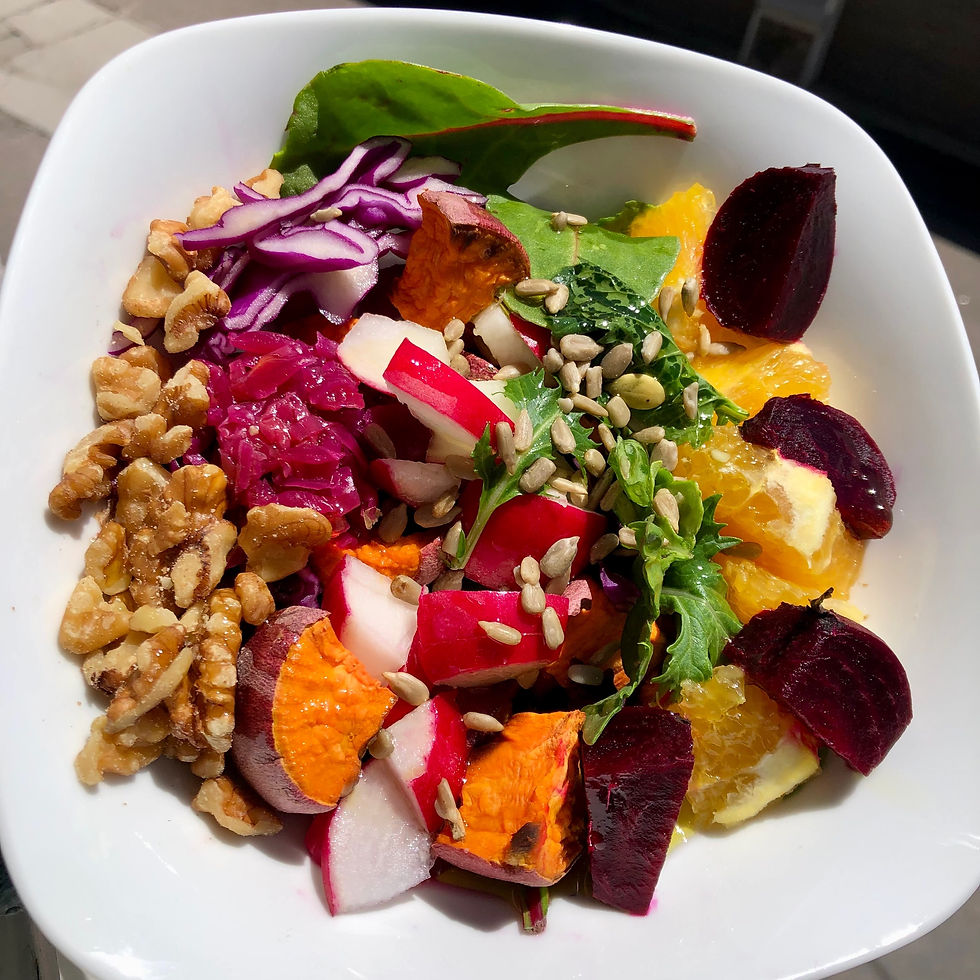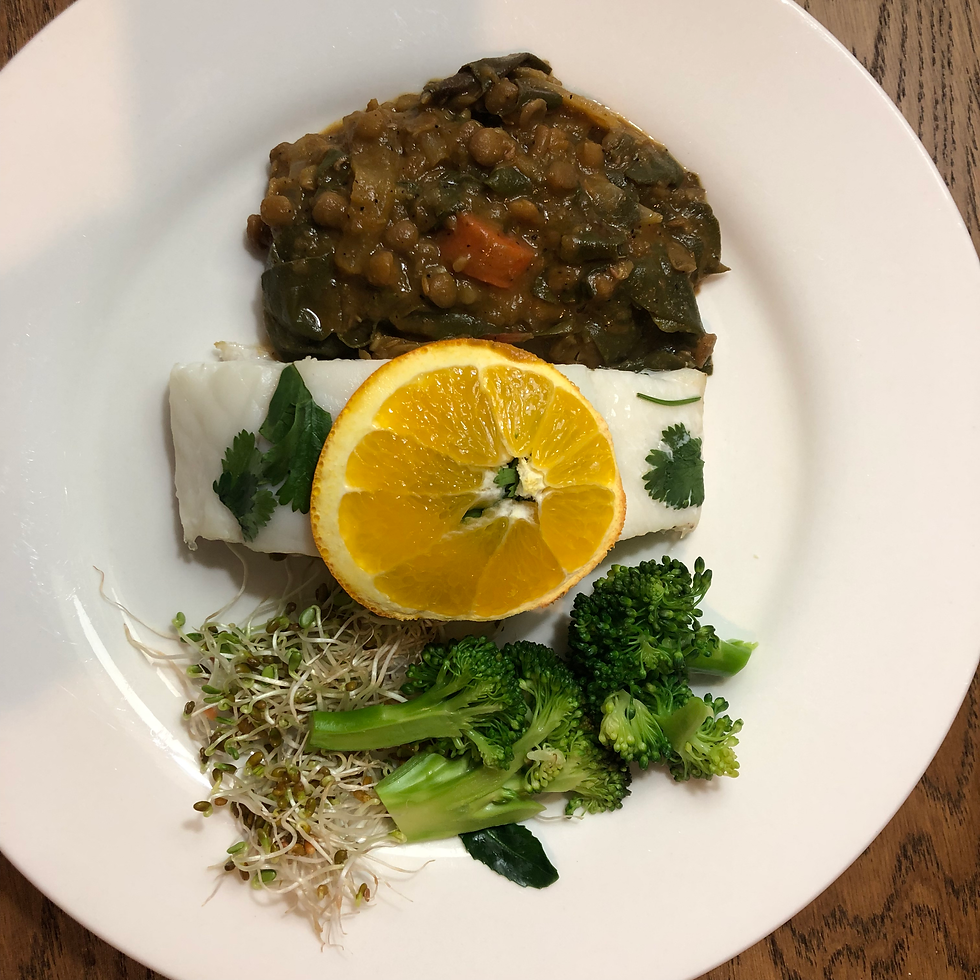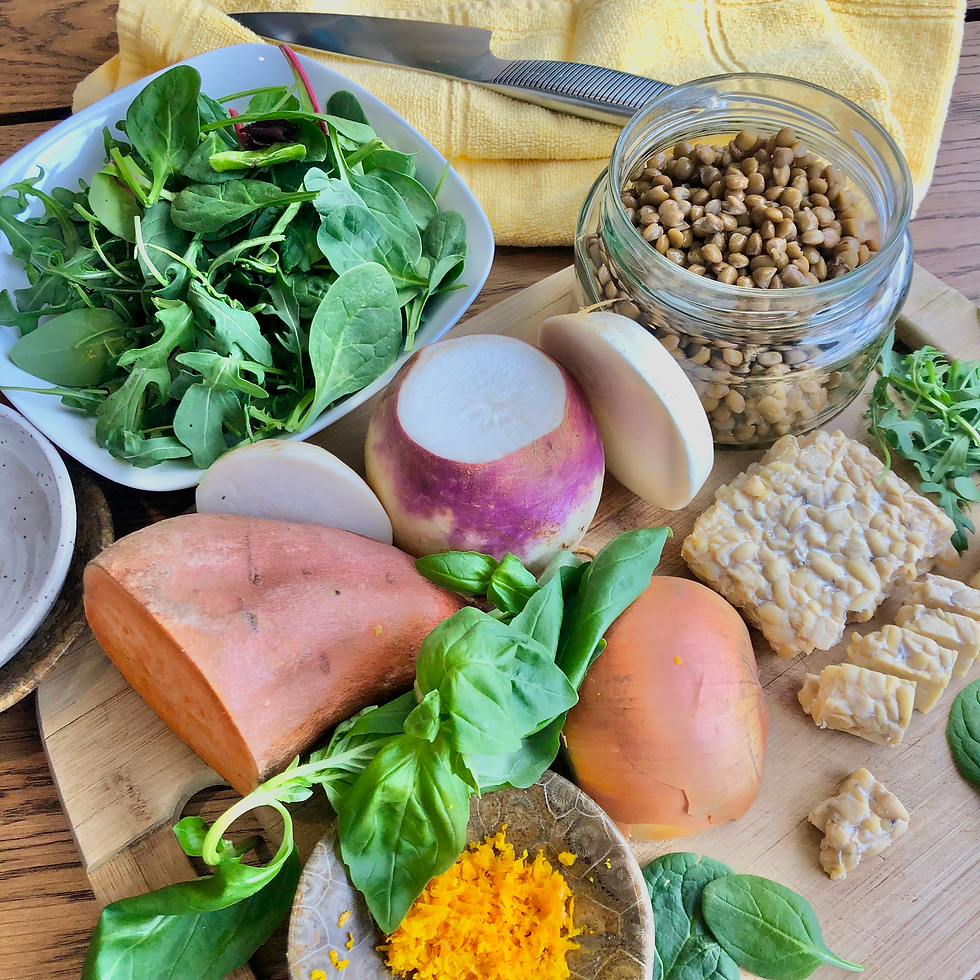
What are carbohydrates and why do we need them?
Carbohydrates are one of three essential macro nutrients which our bodies require in order to function. We need a balance of:
1. Proteins
2. Carbohydrates
3. Fats
Nutritious complex carbohydrate foods are essential for:
cleansing the colon
providing fuel to the brain
creating energy for your body to move and to function properly
providing fuel for the friendly gut bacteria
The 3 main types of carbohydrate are sugar, starch and fibre.
The types of sugars in complex carbohydrate foods break down more slowly. These are foods, such as legumes, wholegrains, vegetables and nuts, which have a low Glycemic Index and are better for you. They help regulate blood sugar.
Nutrient rich carbohydrate foods include:
Beetroot, sweet potato, potato, quinoa, peas, beans and lentils,
bananas, blueberries, carrots, squash, Brussel's sprouts,
nuts, seeds and whole grains.
The wave of" low- carb" diets has attracted much attention. Some people cut down on lollies, white rice, crackers and sugary cereals, along with healthy foods such as beetroot, spuds and sweet potato.

We need fibre:
A diet high in fibre from complex carbohydrates reduces risk of chronic illness, including cancer, heart disease, mental illnesses and diabetes.
Bowel cancer is a rapidly growing disease.
It is widely known that this is mainly due to
modern/Western diets which
lack quality fibre.
Aim for around 30g fibre per day.
Reducing carbs means that many people are lacking intake of fibre, even if they are eating healthy food. Lack of fibre also means less fuel for the essential good gut bacteria.
The low-carb diet culture has led to reduced intake of nutritious foods such as brown rice, buckwheat, oats, beetroot, carrot, sweet potato and legumes. Suddenly beetroot and doughnuts are in the same list of foods to avoid!

Processed carbohydrates to avoid:
These include Fast-food fries, flavoured crackers, store-bought baked goods, candies, lollies and hidden sugar in foods such as yoghurt, peanut butter and sauces. These may also contain food additives which have a detrimental effect on your health.

The amount of carbohydrate foods each
of us needs to consume depends on:
individual healthy history,
energy requirements
age
lifestyle
the type of carbohydrate
Gluten-free: There are a wide range of gluten-free" products in the health food aisle. If you're purchasing gluten free products, read the labels and avoid the ones with fillers, stabilizers and any unwanted ingredients.
Some people find that cutting out gluten has health benefits for digesting food, absorbing nutrients and relieving aching muscles or headaches, and there are plenty of foods which are naturally gluten free, such as quinoa, nut, seeds & vegetables.

Fish with lentils & vegetables, contains fibre, fats and protein, plus a smorgasbord of vitamins & minerals.
Don't count calories... just eat nutritious, real food.
Confusion about calorie counting:
Comments such as "a banana has as much sugar as a soft-drink", have no substance. The sugars in a banana are recognised by the body and used as fuel. They also contain nutrients such as fibre, B6, vitamin C and potassium.
Soft-drinks (soda) have no food value and confuse both the good gut-bacteria and hormone messengers.
Our bodies need complex carbohydrates for many reasons, including:
The energy we use to function each day.
Energy for cells to carry out thousands of interactions which are happening inside us all the time, most of which we are unaware. Cells in the blood use glucose to make ATP (adenosine triphosphate)
The brain relies on a constant fuel source to function, including as we sleep. This comes from glucose in the blood derived from simple and complex sugars from carbohydrate foods. (*Note: The brain doesn't derive fuel from fats. It uses ketones as fuel, produced in the liver from fatty acids, if glucose and insulin are low).
Provide fibre to cleanse, remove toxins & fuel for good gut bacteria.
Fibre feeds the beneficial gut bacteria, from which they make short chain fatty acids, which play important roles in our health, including cell nutrition and reducing inflammation in the body.
Provide micronutrients such as:
Vitamin A
Vitamin C
Potassium
Manganese
Vitamin B6
Vitamin B5
Vitamin E
Biotin
Zinc
Selenium
Phosphorous.

Healthy sources of carbohydrates are unprocessed foods, as close to their origins in nature as possible, hence the nutrients are intact.

Nuts and seeds are a good source of all 3 macronutrients: protein, carbs and fats, so they tick all 3 boxes!
Processing of whole grain foods includes removing husks, chemical processing and heat-treating. These processes remove or destroy nutrients and can change the structure of a food, making it harmful to the body.
White bread, rice & pasta are sources of energy, however they have had the husk removed, which holds all the goodness. If you like to include these in your diet, choose high quality products and introduce more wholegrain bread, pasta and rice, including spelt flour pasta and sour dough bread. It's a good idea to introduce the wholegrain versions mixed with the familiar white products until you and your family get used to the wholegrain foods and buy Australian or European grown grains.
In the 19th Century, as milling became common, and husks were removed from brown rice, people reliant on rice as a staple, developed a disease called "BeriBeri" due to the lack of B1 (Thiamin). These days, white rice is fortified with B1 and other nutrients.
Many people find it beneficial to reduce the amount of white bread and pasta in their diets. These may inflammatory and are often mass-produced grains, are GMO, and grown in depleted soils.
Sweet potato facts:
Yams and sweet potato have formed part of staple diets in many super-healthy populations, including people on the Japanese island of Okinawa (check out "the blue zones"), and the Australian Aborigines, before European influence. See more on the blue zones below.

Sweet potato has lower glycemic index if it is boiled rather than baked.
Sweet potato has a higher glycemic index than regular spuds.
Sweet potatoes are a great source of fibre, antioxidants and carbohydrates.
Sweet potato leaves are edible and nutritious (slightly challenging on the palette though!)
Sweet potato is a yam, and only distantly related to a potato

The Blue Zones are a handful of regions in the world where people enjoyed excellent physical and mental health, and longevity. The diets varied between these five groups; however, they had somethings in common, including a diet rich in quality fresh, local produce which was naturally grown. Across nearly all the groups, small amounts meat and fish were consumed, however, they all consumed large amounts of plant foods. Sweet potato and legumes featured strongly, along with a large number of vegetables, nuts and seeds.
There are certain health conditions and chronic illnesses for which some people have benefitted from a specifically devised low carbohydrate diet.
Such diets are tailored to the individual needs by a nutrition health professional.
Craving something sweet? Add a little raw honey to healthy foods. Here's the recipe for my oat cookies, which are rich in fibre, healthy fats protein. Almond meal and flax is used instead of flour.
If you would like to find out more how coaching together will improve your health habits and overall wellbeing, simply message me to arrange a chat.
Laura x

Comentários